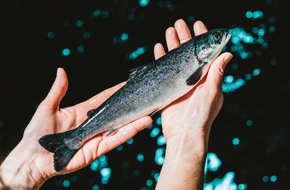Highlights
- Investing in technologies to achieve sustainable food production.
- Transforming nutrient-bearing fish waste into fertiliser to enrich agricultural land.
- Supporting local groups via their ‘Heart of the Community’ initiative, and throughout the COVID-19 pandemic.
- Looking after their local environments, participating in beach cleans, locally and nationally.

With 42 marine farms across Scotland's west coast and the Northern Isles, Scottish Sea Farms (SSF) is one of Scotland's leading growers of premium farmed salmon, supplying customers in over 24 countries worldwide.
SSF have worked hard to minimise the impact of their activities on the environment with highly skilled staff trained to follow the best environmental practice.
SSF’s new Barcaldine Hatchery on the shores of Loch Creran, near Oban, is equipped with technologies to aid sustainable food production, for example by minimising freshwater usage and fossil fuel consumption. As well as a woodchip biomass system, the site also includes provision for its own hydro-scheme.
Measures have also been taken at Barcaldine to facilitate the responsible re-use of fish hatchery waste. Waste material (including faeces and uneaten food) is removed throughout the hatchery growth process. It is aerated to prevent bacteria germinating, bound together into larger particles, and the solids are filtered out and collected. SSF works with Scottish Agricultural College, who evaluate the safety of the sludge, and Rock Highland, who collect the sludge and store it in holding tanks strategically placed across the Highlands. When the safety of the sludge is confirmed, it is spread on land and used as an agricultural fertiliser.
SSF is already working on the next phase of their fish waste recycling plans. Technologies have been identified to enable SSF to remove remaining water and convert the sludge into dry pellets. This could reduce the volume of waste material, thereby reducing the number of tankers and road miles required to transport it from hatchery to farmland.
In 2011, SSF made a formal commitment with their ‘Heart of the Community’ initiative, to provide financial support to local groups, organisations and projects based in their core farming regions. Awards range from a few hundred pounds to £10,000, and, as at October 2020, they had given over £1.2M to local causes. To ensure this money goes where it’s needed, local staff are involved in reviewing the grant applications from their area.
SSF staff participate in beach cleans at both local and national level, including participating in the 2020 Marine Conservation Society’s Great British Beach Clean in team ‘bubbles’ to keep local beaches clean.
SSF has continued to farm, process and supply salmon throughout the COVID-19 pandemic to keep food supplies going. Alongside this, SSF has supported local communities, for example by sharing supplies of protective face masks with local care teams and providing protective suits and hand sanitiser to the Scottish Ambulance Service (Oban).